This past January, in a widely-commented on tweet, the U.S. Conference of Catholic Bishops posted an image highlighting “Seven Attitudes for Walking the Synodal Path,” including “Innovative Outlook,” “Inclusivity,” “Open-Mindedness,” “Listening,” “Accompaniment,” “Co-Responsibility,” and “Dialogue.” More than a few people on Twitter slammed the tweet as promoting “buzzwords,” and the negative responses led the USCCB to briefly close the replies to the tweet. Some took that closure as a sign that the “listening Church” called for by the tweet was in fact not that open to listening.
The alarm about some sort of “buzzword bingo” on the part of the USCCB builds on concerns previously expressed regarding the Synod on Synodality. Some critics have expressed worry that the synod’s focus on “journeying together” will lead the Church toward accommodation with hostile, secular cultures or to erosion of Church teaching, while others suspect the listening process will in fact muzzle challenging and dissenting voices.
In light of these concerns, it is striking that Pope Francis chose to focus on the theme of listening in his message for the 56th World Day of Social Communications. The annual release of these messages began in 1967 and were a direct effect of the Second Vatican Council, whose work for the renewal of the Catholic Church is explicitly referenced as the motivation for this new Synod on Synodality. As part of Vatican II’s engagement with modernity, it promulgated the text Inter Mirifica, focused specifically on “social communications,” which at the time were primarily encountered through radio, television, and newspapers.
In this vein, past popes have mostly used these annual messages to respond to new opportunities or new challenges in communications technologies. Pope Benedict XVI, for example, considered issues such as the role of digital media in the education of children (2007) and pastoral ministry (2010), as well as the possibilities of social networking for evangelization (2013). Previously, Pope John Paul II issued messages on technologies as wide ranging as personal computers (1990), video and audio cassettes (1993), films (1995), and the internet (2002).
Francis’s approach, however, has differed somewhat from his predecessors. While he has referenced various technologies in his messages, they are often secondary to his more deliberate focus on underlying social problems in communications. Theologian Katherine Schmidt argues that Francis seems to have “Luddite propensities,” noting for example that his two references to the internet in the 2016 message on mercy seem to be tacked on or extraneous. Even this most recent message makes passing reference to podcasts and social networks, but these are more asides within the text than substantive points.
Taken as a whole, Francis’s preceding messages for World Day of Social Communications have generally focused on three main themes. First, when he does attend to the technologies, he is mostly concerned about how they can both bring people together and drive them apart. In his first message in 2014, he sought to promote a “culture of encounter” that included being Good Samaritans on the “digital highways” of the world. Yet even here, he emphasizes that “communication is ultimately a human rather than technological achievement.” In his 2019 message focused on social networks, he notes that while these platforms can “help us to better connect, rediscover, and assist one another,” they also facilitate the abusive practice of cyberbullying.
Second, in order to encourage the positive possibilities of connection, he emphasizes the virtues and attitudes that ought to guide one’s engagement with communications technologies. He repeatedly notes the need for respect and love as part of the posture one should have toward those one encounters online. As part of his Year of Mercy, his 2016 message claimed that, “Only words spoken with love and accompanied by meekness and mercy can touch our sinful hearts.” In 2018, he entered into the public discussion around disinformation and “fake news,” highlighting how the vice of greed can lead one away from a commitment to speaking the truth in love.
Third, Francis has consistently pointed to “listening” as perhaps the most essential of these virtues in social communication. He frequently exhorts his readers to be “genuinely attentive in listening to others,” (2014) because, “Listening means paying attention, wanting to understand, to value, to respect, and to ponder what the other person says.” (2016). Francis sees listening as an indispensable element in all authentic human communication. Moreover, it is an element that he fears is persistently lacking in human relations, whether mediated through digital means or otherwise.
These three themes are present in abundance in his 2022 message for World Communications Day. He describes listening as “a dimension of love,” necessary for being “in relationship with others and with the Other.” It is a refusal to listen, sometimes expressed as rejection, sometimes as manipulation of what the other says, and sometimes as simply waiting for one’s own opportunity to monologue, that promotes division and separation. Further, Francis highlights that listening requires patience as well as risk, as one puts oneself in a position to be surprised by the experience and insights of another. Fundamentally, listening takes time and resists the technocratic impulse to have quick fixes or life hacks for difficult situations.
Francis’s approach to listening implicitly rejects the assertion that listening is simply an empty buzzword, relevant only in a corporatized managerial culture. Rather, he grounds his sense of listening in the revelation of the divine-human relationship in Scripture. He notes both that God calls human beings to listen, as expressed in the Shema Israel prayer (which opens “Hear, O Israel: The Lord is our God, the Lord alone!”), and that “inclines his ear” to listen to the prayers and concerns of humanity.
Moreover, he points to scriptural narratives of the failure to listen, such as those who “covered their ears” to avoid Stephen’s proclamation of the Gospel in Acts 7, and how such failures are in fact human failures to love. Francis’s emphasis on listening in this text picks up on his homily from the opening Mass of the “synodal path” in October. There, while reflecting on the story of the rich young man in the Gospel of Mark, Francis characterizes Jesus’s approach as one of encountering, listening, and discernment. In that homily, Francis notes the need to take time to listen and to speak honestly and with integrity, so as “to avoid artificial and shallow and pre-packaged responses.” In the more recent message, he notes that such openness can “allow oneself to be surprised by the truth, even if only a fragment of truth, in the person we are listening to.”
Reflecting on the challenge of Christian pluralism, theologian Hans Urs von Balthasar wrote in Truth is Symphonic that, “the purpose of its pluralism is this: not to refuse to enter into the unity that lies in God and is imparted by him, but symphonically to get in tune with one another and give allegiance to the transcendent unity.” In this image, Balthasar does not see any room for a passive, non-playing audience; all are musicians who are called to play together.
With his most recent message on social communications, Pope Francis reflects this Balthasarian insight through the emphasis on listening: “With the awareness that we participate in a communion that precedes and includes us, we can rediscover a symphonic Church, in which each person is able to sing with his or her own voice, welcoming the voices of others as a gift to manifest the harmony of the whole that the Holy Spirit composes.” The multitude of voices, the fragments being gathered together, can become as a symphony, a harmony achieved through polyphony.


